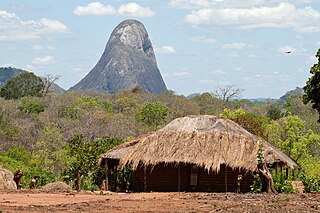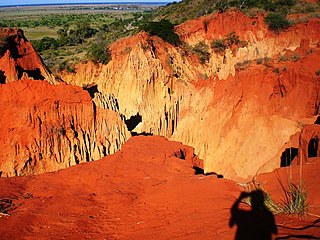Related Research Articles

Mozambique, officially the Republic of Mozambique, is a country located in Southeastern Africa bordered by the Indian Ocean to the east, Tanzania to the north, Malawi and Zambia to the northwest, Zimbabwe to the west, and Eswatini (Swaziland) and South Africa to the southwest. The sovereign state is separated from the Comoros, Mayotte and Madagascar by the Mozambique Channel to the east. The capital and largest city of Mozambique is Maputo.

The demographics of Mozambique describes the condition and overview of Mozambique's peoples. Demographic topics include basic education, health, and population statistics as well as identified racial and religious affiliations.
Telecommunications in Mozambique include radio, television, fixed and mobile telephones, and the Internet.

Nampula is a province of northern Mozambique. It has an area of 79,010 km² and a population of 5,758,920, making it the most populous province in Mozambique. Nampula is the capital of the province.

Maputo Province is a province of Mozambique; the province excludes the city of Maputo. The province has an area of 22,693 km2 (8,762 sq mi) and a population of 1,968,906. Its capital is the city of Matola.

Hinduism has approximately 1.2 billion adherents worldwide. Nepal (82%) and India (80.3%) are countries with Hindus being the majority of their respective populations, while Mauritius have (48.5%) population as followers of Hindu religion. Along with Christianity (31.5%) and Islam (23.2%), Hinduism is one of the three major religions of the world by percentage of population. Hinduism is the third largest religion in the world after Christianity and Islam.

Matola is the largest suburb of the Mozambique capital, Maputo, adjacent to its westernmost side. It is the nation's second most populated city. Matola is the capital of Maputo Province and has had its own elected municipal government since 1998. It has a port and also the biggest industrial area in Mozambique. The population of Matola was, according to the 2007 census, 671,556 inhabitants, having increased to a 2017 census population of 1,032,197.
The Makonde are an ethnic group in southeast Tanzania, northern Mozambique, and Kenya. The Makonde developed their culture on the Mueda Plateau in Mozambique. At present they live throughout Tanzania and Mozambique, and have a small presence in Kenya. The Makonde population in Tanzania was estimated in 2001 to be 1,140,000, and the 1997 census in Mozambique put the Makonde population in that country at 233,358, for an estimated total of 1,373,358. The ethnic group is roughly divided by the Ruvuma River; members of the group in Tanzania are referred to as the Makonde, and those in Mozambique as the Maconde. The two groups have developed separate languages over time but share a common origin and culture.
Protestants in Mozambique are part of a variety of denominations. Since the Portuguese colonial period in Mozambique, the Catholic Church has been the main Christian group in the country, followed by various Protestant mission churches and African Independent Churches (AICs). The results of the last census show that Catholicism is no longer the most important religion in the southern provinces of Maputo, Gaza and Inhambane. Zion believers, belonging to the largest AICs, constitute the majority of the population, exceeding the Catholics. Looking at the whole of Mozambique, Zionism is the third religion, representing 16 per cent of the total population, only surpassed by Catholicism (28%) and Islam (18%). For the first time, Evangelicals and Pentecostals were counted together as one separate category in the 2007 Census, representing 11 per cent of the total population and thus are the fourth religious group in the country.
The United Baptist Church of Mozambique is a Baptist Christian denomination in Mozambique. The headquarters is in Maputo.

Mozambique is a multilingual country. A number of Bantu languages are indigenous to Mozambique. Portuguese, inherited from the colonial period, is the official language, and Mozambique is a full member of the Community of Portuguese Language Countries. Ethnologue lists 43 languages spoken in the country.

Estimates about adherents of Islam in Mozambique vary between 17% and 45% of the total population. The vast majority of Mozambican Muslims are Sunni Muslims. The Muslims consist primarily of indigenous Mozambicans, citizens of South Asian descent, and a very small number of North African and Middle Eastern immigrants.

Mozambique has a historic Hindu community. Some of their ancestors came to Mozambique at least 500 years ago. Predating their economic participation in Mozambique before the arrival of Vasco da Gama, they adapted during the Portuguese colonial rule. An exodus began during the civil wars between 1975–1990. After 1990 political and social reforms in Mozambique, the Hindu community along with the other minority religions, have once again begun to become vibrant.
The culture of Mozambique is in large part derived from its history of Bantu, Swahili, and Portuguese rule, and has expanded since independence in 1975. The majority of its inhabitants are black Africans. Its main language is Portuguese. Its median religion is Roman Catholicism, but only about 40% of the inhabitants are Christian. It has a rich history in the areas of arts, cuisine, and entertainment.
Mocuba District is a district of Zambezia Province in Mozambique. The main town is Mocuba.

Lago District is a district of Niassa Province in north-western Mozambique. The principal town is Metangula. Lago District is bordered to the west by Lake Nyasa, on the south by Lichinga, on the east by Sanga District. Lago shares its northern boundary with Tanzania.

Alto Molocue District is a district of Zambezia Province in Mozambique. It covers, 6,368 km² and has a population of, 278,064.

Ancuabe is a town in eastern Mozambique in Ancuabe District, Cabo Delgado Province. It is the seat of the district. According to the 1997 census it has a population of 12,561.

According to the most recent census conducted by the National Institute of Statistics in 2007, 56.1% of the population of Mozambique were Christian, 17.9% were Muslim, 18.7% had no religion, and 7.3% adhered to other beliefs. These figures need to be used with caution, especially those for the population that is categorised as having no religion, a significant section of whom is likely to practice traditional animist beliefs.
The Baháʼí Faith in Mozambique begins after the mention of Africa in Baháʼí literature when ʻAbdu'l-Bahá suggested it as a place to take the religion to in 1916. The first known Baháʼí to enter the region was in 1951–52 at Beira when a British pioneer came through on the way to what was then Rhodesia, now Zimbabwe. The Mozambique Baháʼí community participated in successive stages of regional organization across southern Africa from 1956 through the election of its first Mozambique Baháʼí Local Spiritual Assembly in 1957 and on to its own National Spiritual Assembly was elected in 1985. Since 1984 the Baháʼís have begun to hold development projects. The Association of Religion Data Archives estimated just over 2,800 Baháʼís in 2005.
